Pornography Ethics: Examining Utilitarianism and Social Impact
VerifiedAdded on 2023/06/08
|6
|1721
|469
Essay
AI Summary
This essay delves into the ethical considerations surrounding pornography, primarily examining it through a utilitarian lens. It explores the concept of sexual autonomy, the pleasure principle, and the harm principle, arguing that individuals have the right to seek sexual satisfaction and pleasure without causing harm to others. The essay analyzes the viewpoints of proponents and opponents of pornography, including feminists, and discusses the societal impact of pornography, including potential issues of objectification and exploitation. The author concludes that the ethics of pornography hinge on individual pleasure and the avoidance of harm to others, emphasizing that pornography should be treated as a private matter. The essay references several academic sources to support its arguments.
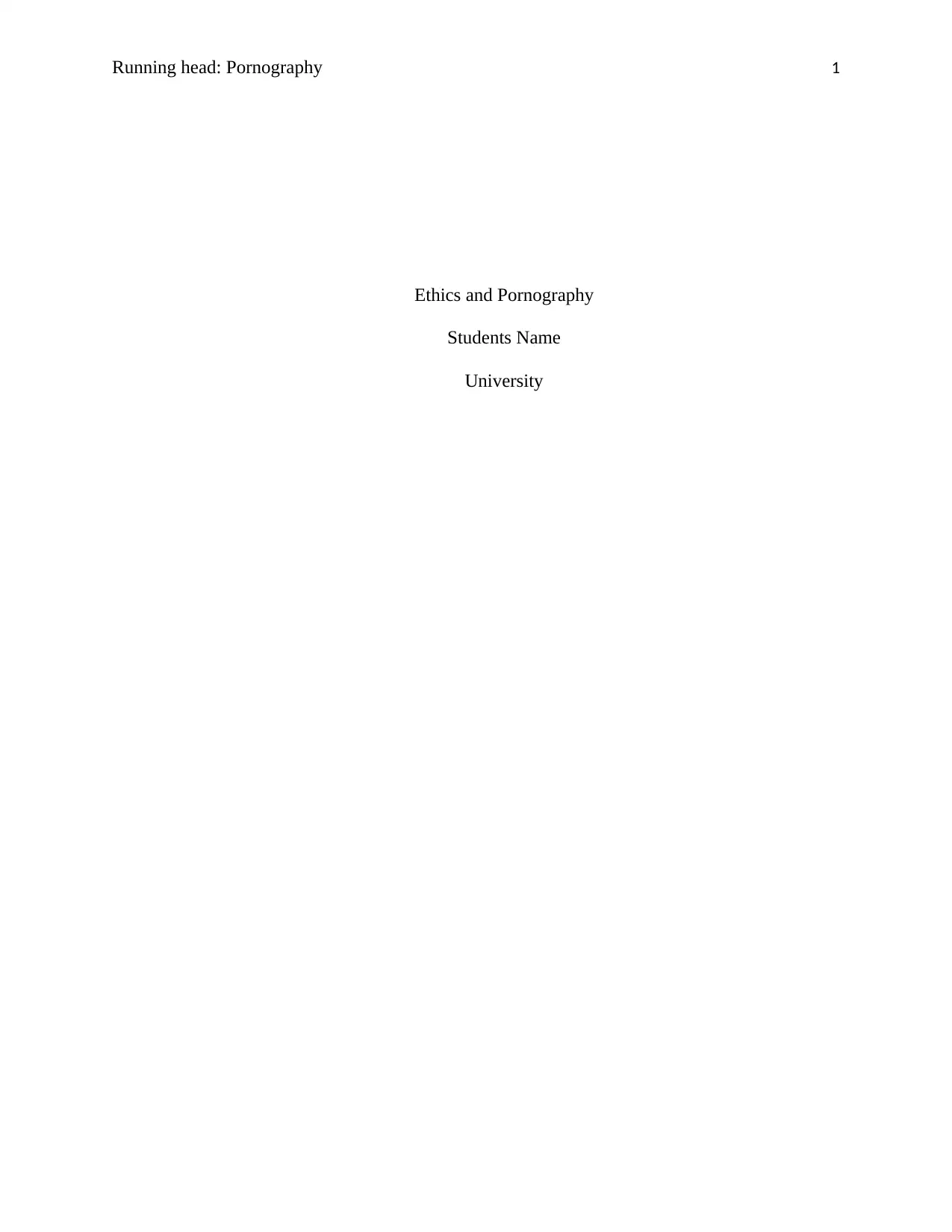
Running head: Pornography 1
Ethics and Pornography
Students Name
University
Ethics and Pornography
Students Name
University
Paraphrase This Document
Need a fresh take? Get an instant paraphrase of this document with our AI Paraphraser
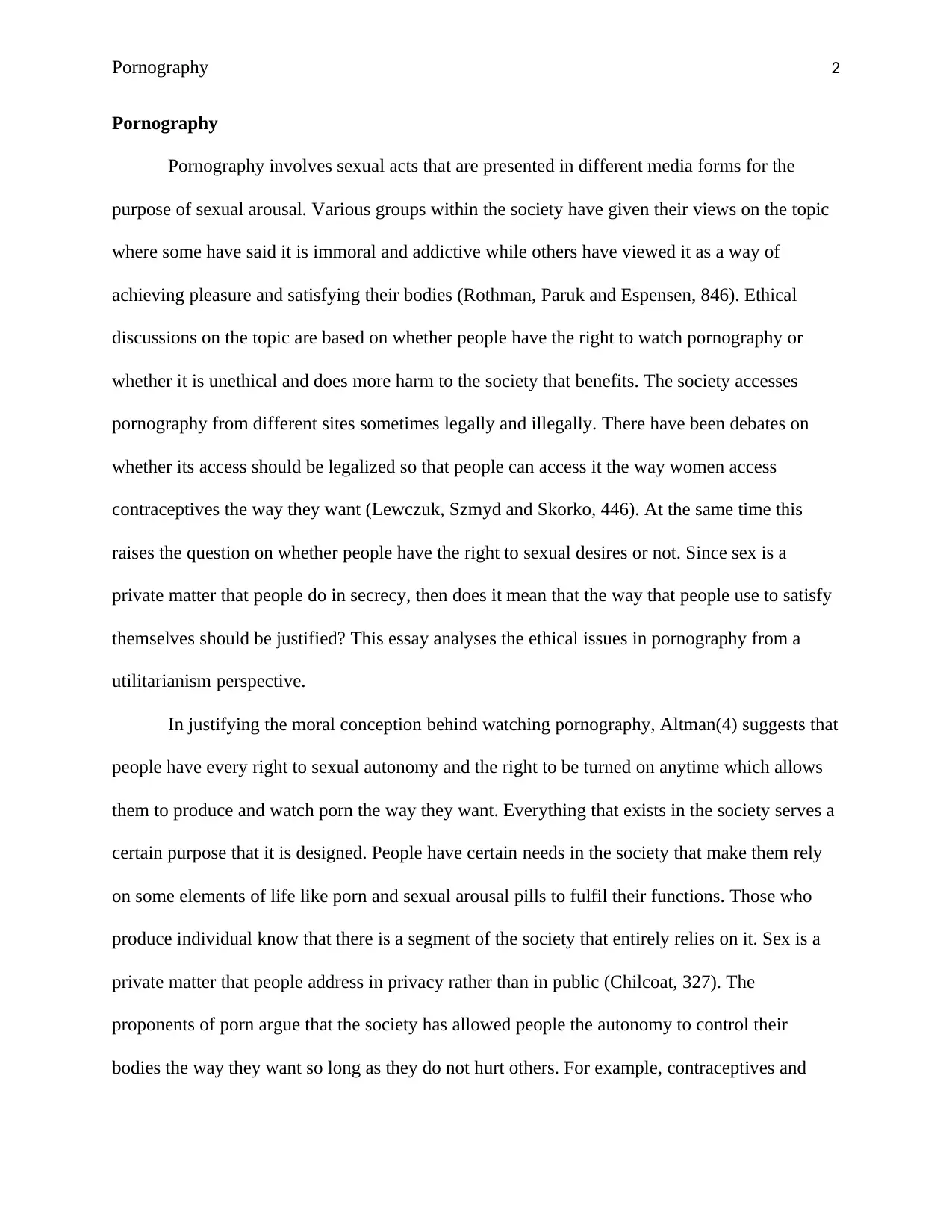
Pornography 2
Pornography
Pornography involves sexual acts that are presented in different media forms for the
purpose of sexual arousal. Various groups within the society have given their views on the topic
where some have said it is immoral and addictive while others have viewed it as a way of
achieving pleasure and satisfying their bodies (Rothman, Paruk and Espensen, 846). Ethical
discussions on the topic are based on whether people have the right to watch pornography or
whether it is unethical and does more harm to the society that benefits. The society accesses
pornography from different sites sometimes legally and illegally. There have been debates on
whether its access should be legalized so that people can access it the way women access
contraceptives the way they want (Lewczuk, Szmyd and Skorko, 446). At the same time this
raises the question on whether people have the right to sexual desires or not. Since sex is a
private matter that people do in secrecy, then does it mean that the way that people use to satisfy
themselves should be justified? This essay analyses the ethical issues in pornography from a
utilitarianism perspective.
In justifying the moral conception behind watching pornography, Altman(4) suggests that
people have every right to sexual autonomy and the right to be turned on anytime which allows
them to produce and watch porn the way they want. Everything that exists in the society serves a
certain purpose that it is designed. People have certain needs in the society that make them rely
on some elements of life like porn and sexual arousal pills to fulfil their functions. Those who
produce individual know that there is a segment of the society that entirely relies on it. Sex is a
private matter that people address in privacy rather than in public (Chilcoat, 327). The
proponents of porn argue that the society has allowed people the autonomy to control their
bodies the way they want so long as they do not hurt others. For example, contraceptives and
Pornography
Pornography involves sexual acts that are presented in different media forms for the
purpose of sexual arousal. Various groups within the society have given their views on the topic
where some have said it is immoral and addictive while others have viewed it as a way of
achieving pleasure and satisfying their bodies (Rothman, Paruk and Espensen, 846). Ethical
discussions on the topic are based on whether people have the right to watch pornography or
whether it is unethical and does more harm to the society that benefits. The society accesses
pornography from different sites sometimes legally and illegally. There have been debates on
whether its access should be legalized so that people can access it the way women access
contraceptives the way they want (Lewczuk, Szmyd and Skorko, 446). At the same time this
raises the question on whether people have the right to sexual desires or not. Since sex is a
private matter that people do in secrecy, then does it mean that the way that people use to satisfy
themselves should be justified? This essay analyses the ethical issues in pornography from a
utilitarianism perspective.
In justifying the moral conception behind watching pornography, Altman(4) suggests that
people have every right to sexual autonomy and the right to be turned on anytime which allows
them to produce and watch porn the way they want. Everything that exists in the society serves a
certain purpose that it is designed. People have certain needs in the society that make them rely
on some elements of life like porn and sexual arousal pills to fulfil their functions. Those who
produce individual know that there is a segment of the society that entirely relies on it. Sex is a
private matter that people address in privacy rather than in public (Chilcoat, 327). The
proponents of porn argue that the society has allowed people the autonomy to control their
bodies the way they want so long as they do not hurt others. For example, contraceptives and
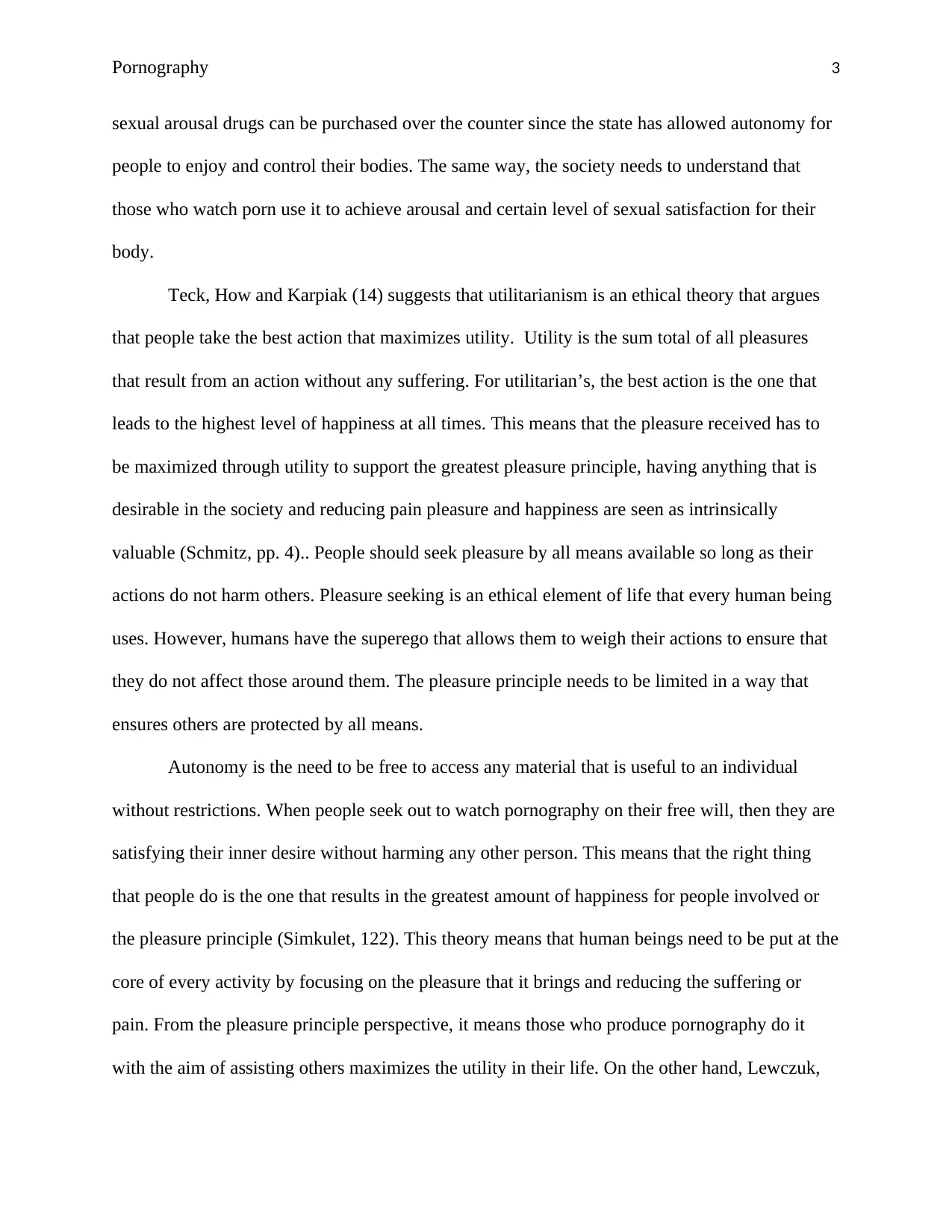
Pornography 3
sexual arousal drugs can be purchased over the counter since the state has allowed autonomy for
people to enjoy and control their bodies. The same way, the society needs to understand that
those who watch porn use it to achieve arousal and certain level of sexual satisfaction for their
body.
Teck, How and Karpiak (14) suggests that utilitarianism is an ethical theory that argues
that people take the best action that maximizes utility. Utility is the sum total of all pleasures
that result from an action without any suffering. For utilitarian’s, the best action is the one that
leads to the highest level of happiness at all times. This means that the pleasure received has to
be maximized through utility to support the greatest pleasure principle, having anything that is
desirable in the society and reducing pain pleasure and happiness are seen as intrinsically
valuable (Schmitz, pp. 4).. People should seek pleasure by all means available so long as their
actions do not harm others. Pleasure seeking is an ethical element of life that every human being
uses. However, humans have the superego that allows them to weigh their actions to ensure that
they do not affect those around them. The pleasure principle needs to be limited in a way that
ensures others are protected by all means.
Autonomy is the need to be free to access any material that is useful to an individual
without restrictions. When people seek out to watch pornography on their free will, then they are
satisfying their inner desire without harming any other person. This means that the right thing
that people do is the one that results in the greatest amount of happiness for people involved or
the pleasure principle (Simkulet, 122). This theory means that human beings need to be put at the
core of every activity by focusing on the pleasure that it brings and reducing the suffering or
pain. From the pleasure principle perspective, it means those who produce pornography do it
with the aim of assisting others maximizes the utility in their life. On the other hand, Lewczuk,
sexual arousal drugs can be purchased over the counter since the state has allowed autonomy for
people to enjoy and control their bodies. The same way, the society needs to understand that
those who watch porn use it to achieve arousal and certain level of sexual satisfaction for their
body.
Teck, How and Karpiak (14) suggests that utilitarianism is an ethical theory that argues
that people take the best action that maximizes utility. Utility is the sum total of all pleasures
that result from an action without any suffering. For utilitarian’s, the best action is the one that
leads to the highest level of happiness at all times. This means that the pleasure received has to
be maximized through utility to support the greatest pleasure principle, having anything that is
desirable in the society and reducing pain pleasure and happiness are seen as intrinsically
valuable (Schmitz, pp. 4).. People should seek pleasure by all means available so long as their
actions do not harm others. Pleasure seeking is an ethical element of life that every human being
uses. However, humans have the superego that allows them to weigh their actions to ensure that
they do not affect those around them. The pleasure principle needs to be limited in a way that
ensures others are protected by all means.
Autonomy is the need to be free to access any material that is useful to an individual
without restrictions. When people seek out to watch pornography on their free will, then they are
satisfying their inner desire without harming any other person. This means that the right thing
that people do is the one that results in the greatest amount of happiness for people involved or
the pleasure principle (Simkulet, 122). This theory means that human beings need to be put at the
core of every activity by focusing on the pleasure that it brings and reducing the suffering or
pain. From the pleasure principle perspective, it means those who produce pornography do it
with the aim of assisting others maximizes the utility in their life. On the other hand, Lewczuk,
⊘ This is a preview!⊘
Do you want full access?
Subscribe today to unlock all pages.

Trusted by 1+ million students worldwide
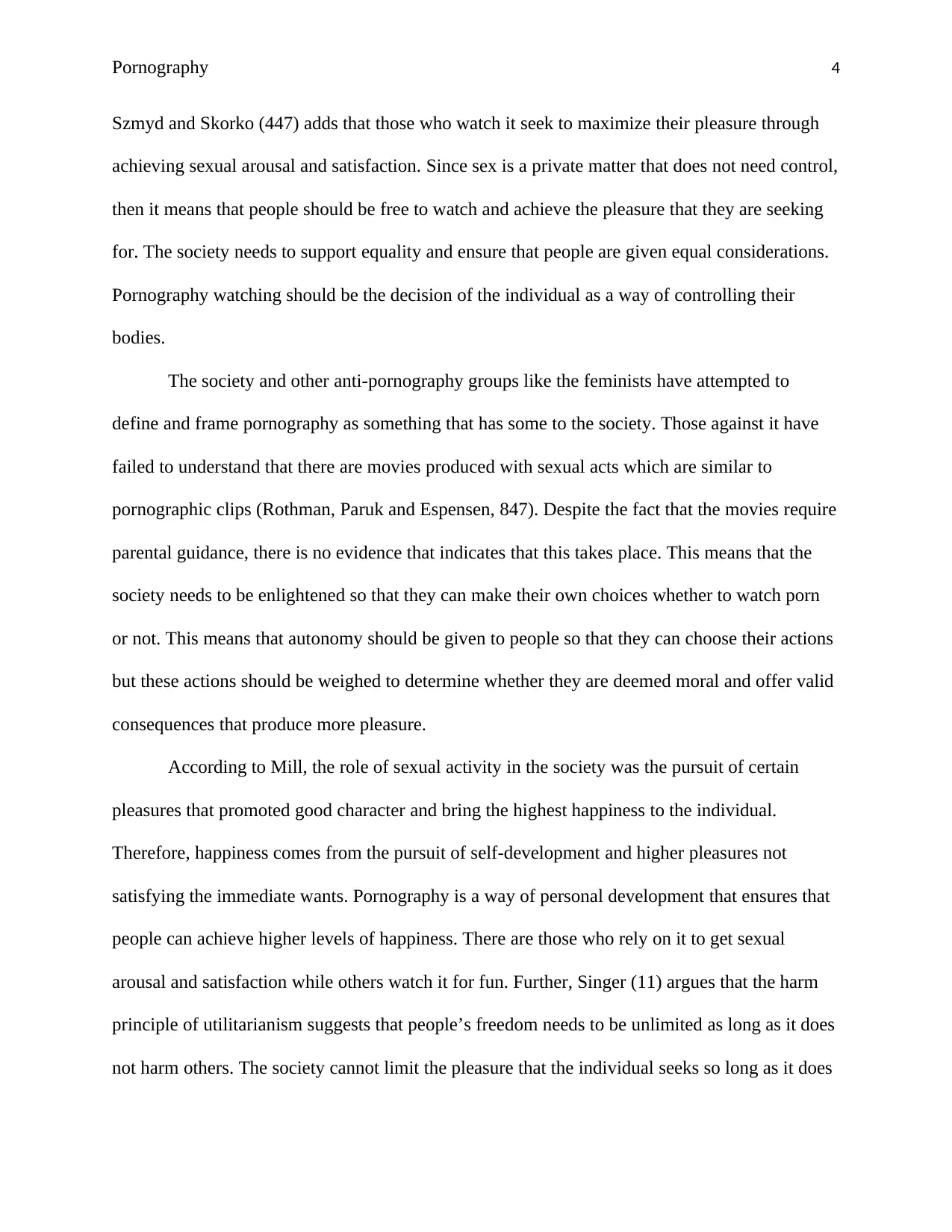
Pornography 4
Szmyd and Skorko (447) adds that those who watch it seek to maximize their pleasure through
achieving sexual arousal and satisfaction. Since sex is a private matter that does not need control,
then it means that people should be free to watch and achieve the pleasure that they are seeking
for. The society needs to support equality and ensure that people are given equal considerations.
Pornography watching should be the decision of the individual as a way of controlling their
bodies.
The society and other anti-pornography groups like the feminists have attempted to
define and frame pornography as something that has some to the society. Those against it have
failed to understand that there are movies produced with sexual acts which are similar to
pornographic clips (Rothman, Paruk and Espensen, 847). Despite the fact that the movies require
parental guidance, there is no evidence that indicates that this takes place. This means that the
society needs to be enlightened so that they can make their own choices whether to watch porn
or not. This means that autonomy should be given to people so that they can choose their actions
but these actions should be weighed to determine whether they are deemed moral and offer valid
consequences that produce more pleasure.
According to Mill, the role of sexual activity in the society was the pursuit of certain
pleasures that promoted good character and bring the highest happiness to the individual.
Therefore, happiness comes from the pursuit of self-development and higher pleasures not
satisfying the immediate wants. Pornography is a way of personal development that ensures that
people can achieve higher levels of happiness. There are those who rely on it to get sexual
arousal and satisfaction while others watch it for fun. Further, Singer (11) argues that the harm
principle of utilitarianism suggests that people’s freedom needs to be unlimited as long as it does
not harm others. The society cannot limit the pleasure that the individual seeks so long as it does
Szmyd and Skorko (447) adds that those who watch it seek to maximize their pleasure through
achieving sexual arousal and satisfaction. Since sex is a private matter that does not need control,
then it means that people should be free to watch and achieve the pleasure that they are seeking
for. The society needs to support equality and ensure that people are given equal considerations.
Pornography watching should be the decision of the individual as a way of controlling their
bodies.
The society and other anti-pornography groups like the feminists have attempted to
define and frame pornography as something that has some to the society. Those against it have
failed to understand that there are movies produced with sexual acts which are similar to
pornographic clips (Rothman, Paruk and Espensen, 847). Despite the fact that the movies require
parental guidance, there is no evidence that indicates that this takes place. This means that the
society needs to be enlightened so that they can make their own choices whether to watch porn
or not. This means that autonomy should be given to people so that they can choose their actions
but these actions should be weighed to determine whether they are deemed moral and offer valid
consequences that produce more pleasure.
According to Mill, the role of sexual activity in the society was the pursuit of certain
pleasures that promoted good character and bring the highest happiness to the individual.
Therefore, happiness comes from the pursuit of self-development and higher pleasures not
satisfying the immediate wants. Pornography is a way of personal development that ensures that
people can achieve higher levels of happiness. There are those who rely on it to get sexual
arousal and satisfaction while others watch it for fun. Further, Singer (11) argues that the harm
principle of utilitarianism suggests that people’s freedom needs to be unlimited as long as it does
not harm others. The society cannot limit the pleasure that the individual seeks so long as it does
Paraphrase This Document
Need a fresh take? Get an instant paraphrase of this document with our AI Paraphraser
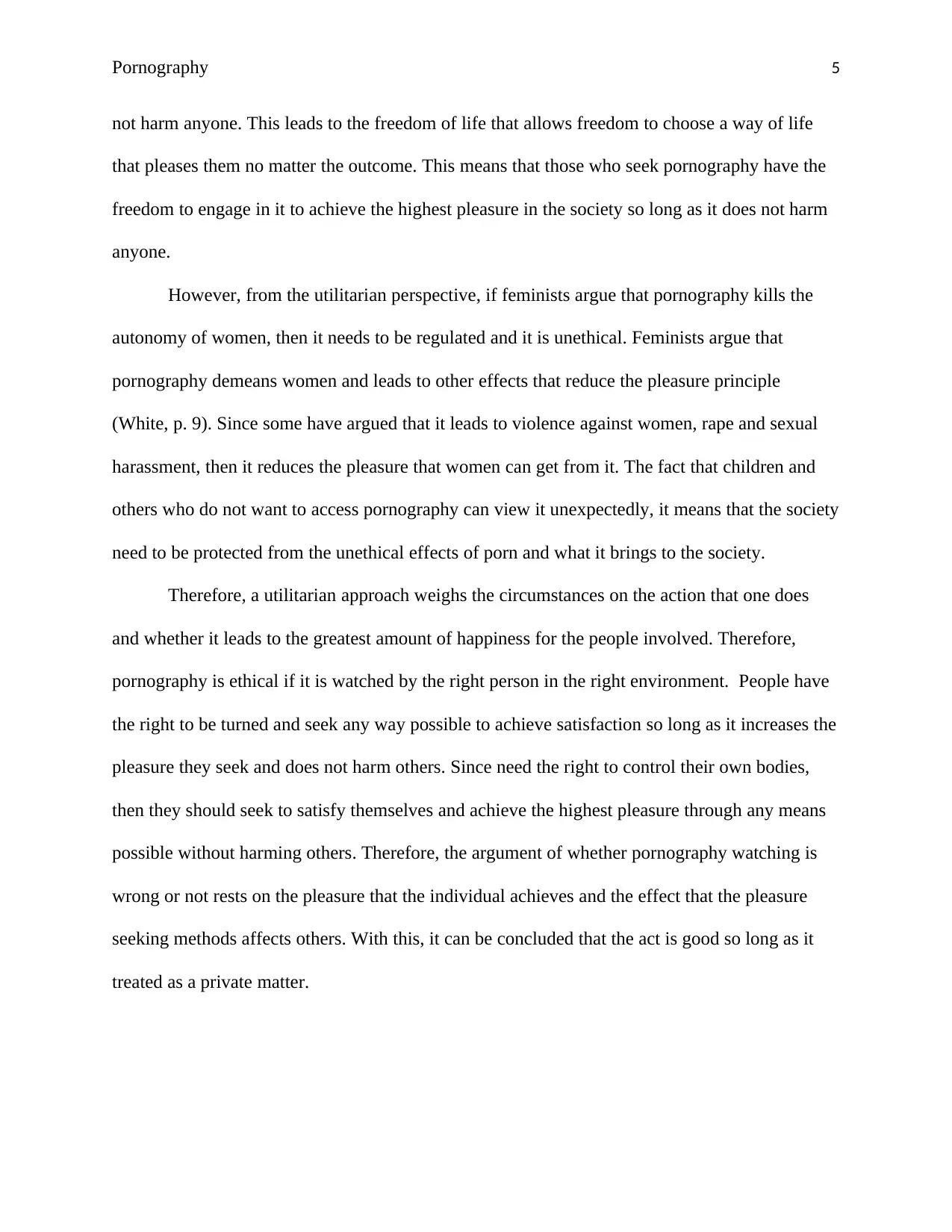
Pornography 5
not harm anyone. This leads to the freedom of life that allows freedom to choose a way of life
that pleases them no matter the outcome. This means that those who seek pornography have the
freedom to engage in it to achieve the highest pleasure in the society so long as it does not harm
anyone.
However, from the utilitarian perspective, if feminists argue that pornography kills the
autonomy of women, then it needs to be regulated and it is unethical. Feminists argue that
pornography demeans women and leads to other effects that reduce the pleasure principle
(White, p. 9). Since some have argued that it leads to violence against women, rape and sexual
harassment, then it reduces the pleasure that women can get from it. The fact that children and
others who do not want to access pornography can view it unexpectedly, it means that the society
need to be protected from the unethical effects of porn and what it brings to the society.
Therefore, a utilitarian approach weighs the circumstances on the action that one does
and whether it leads to the greatest amount of happiness for the people involved. Therefore,
pornography is ethical if it is watched by the right person in the right environment. People have
the right to be turned and seek any way possible to achieve satisfaction so long as it increases the
pleasure they seek and does not harm others. Since need the right to control their own bodies,
then they should seek to satisfy themselves and achieve the highest pleasure through any means
possible without harming others. Therefore, the argument of whether pornography watching is
wrong or not rests on the pleasure that the individual achieves and the effect that the pleasure
seeking methods affects others. With this, it can be concluded that the act is good so long as it
treated as a private matter.
not harm anyone. This leads to the freedom of life that allows freedom to choose a way of life
that pleases them no matter the outcome. This means that those who seek pornography have the
freedom to engage in it to achieve the highest pleasure in the society so long as it does not harm
anyone.
However, from the utilitarian perspective, if feminists argue that pornography kills the
autonomy of women, then it needs to be regulated and it is unethical. Feminists argue that
pornography demeans women and leads to other effects that reduce the pleasure principle
(White, p. 9). Since some have argued that it leads to violence against women, rape and sexual
harassment, then it reduces the pleasure that women can get from it. The fact that children and
others who do not want to access pornography can view it unexpectedly, it means that the society
need to be protected from the unethical effects of porn and what it brings to the society.
Therefore, a utilitarian approach weighs the circumstances on the action that one does
and whether it leads to the greatest amount of happiness for the people involved. Therefore,
pornography is ethical if it is watched by the right person in the right environment. People have
the right to be turned and seek any way possible to achieve satisfaction so long as it increases the
pleasure they seek and does not harm others. Since need the right to control their own bodies,
then they should seek to satisfy themselves and achieve the highest pleasure through any means
possible without harming others. Therefore, the argument of whether pornography watching is
wrong or not rests on the pleasure that the individual achieves and the effect that the pleasure
seeking methods affects others. With this, it can be concluded that the act is good so long as it
treated as a private matter.
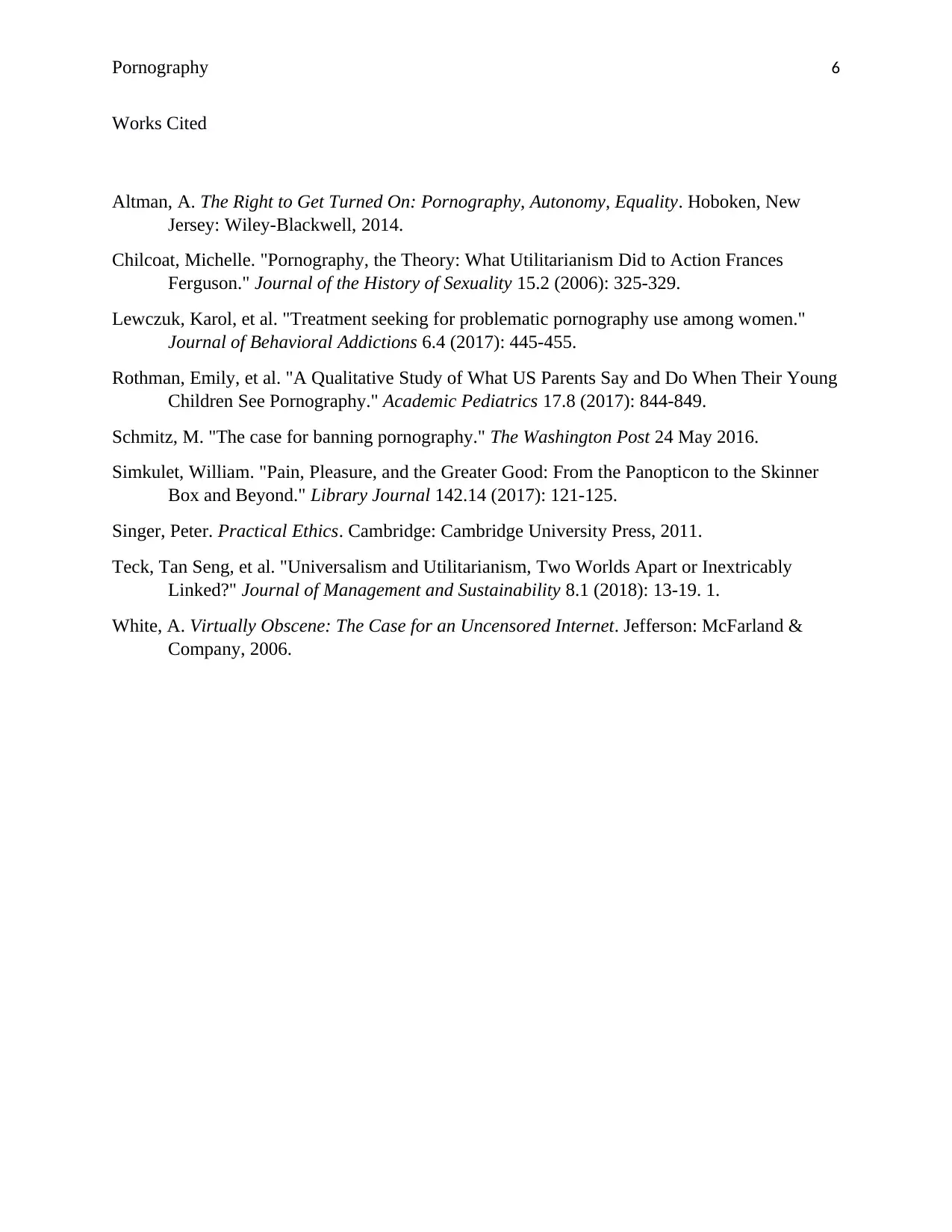
Pornography 6
Works Cited
Altman, A. The Right to Get Turned On: Pornography, Autonomy, Equality. Hoboken, New
Jersey: Wiley-Blackwell, 2014.
Chilcoat, Michelle. "Pornography, the Theory: What Utilitarianism Did to Action Frances
Ferguson." Journal of the History of Sexuality 15.2 (2006): 325-329.
Lewczuk, Karol, et al. "Treatment seeking for problematic pornography use among women."
Journal of Behavioral Addictions 6.4 (2017): 445-455.
Rothman, Emily, et al. "A Qualitative Study of What US Parents Say and Do When Their Young
Children See Pornography." Academic Pediatrics 17.8 (2017): 844-849.
Schmitz, M. "The case for banning pornography." The Washington Post 24 May 2016.
Simkulet, William. "Pain, Pleasure, and the Greater Good: From the Panopticon to the Skinner
Box and Beyond." Library Journal 142.14 (2017): 121-125.
Singer, Peter. Practical Ethics. Cambridge: Cambridge University Press, 2011.
Teck, Tan Seng, et al. "Universalism and Utilitarianism, Two Worlds Apart or Inextricably
Linked?" Journal of Management and Sustainability 8.1 (2018): 13-19. 1.
White, A. Virtually Obscene: The Case for an Uncensored Internet. Jefferson: McFarland &
Company, 2006.
Works Cited
Altman, A. The Right to Get Turned On: Pornography, Autonomy, Equality. Hoboken, New
Jersey: Wiley-Blackwell, 2014.
Chilcoat, Michelle. "Pornography, the Theory: What Utilitarianism Did to Action Frances
Ferguson." Journal of the History of Sexuality 15.2 (2006): 325-329.
Lewczuk, Karol, et al. "Treatment seeking for problematic pornography use among women."
Journal of Behavioral Addictions 6.4 (2017): 445-455.
Rothman, Emily, et al. "A Qualitative Study of What US Parents Say and Do When Their Young
Children See Pornography." Academic Pediatrics 17.8 (2017): 844-849.
Schmitz, M. "The case for banning pornography." The Washington Post 24 May 2016.
Simkulet, William. "Pain, Pleasure, and the Greater Good: From the Panopticon to the Skinner
Box and Beyond." Library Journal 142.14 (2017): 121-125.
Singer, Peter. Practical Ethics. Cambridge: Cambridge University Press, 2011.
Teck, Tan Seng, et al. "Universalism and Utilitarianism, Two Worlds Apart or Inextricably
Linked?" Journal of Management and Sustainability 8.1 (2018): 13-19. 1.
White, A. Virtually Obscene: The Case for an Uncensored Internet. Jefferson: McFarland &
Company, 2006.
⊘ This is a preview!⊘
Do you want full access?
Subscribe today to unlock all pages.

Trusted by 1+ million students worldwide
1 out of 6
Your All-in-One AI-Powered Toolkit for Academic Success.
+13062052269
info@desklib.com
Available 24*7 on WhatsApp / Email
![[object Object]](/_next/static/media/star-bottom.7253800d.svg)
Unlock your academic potential
Copyright © 2020–2025 A2Z Services. All Rights Reserved. Developed and managed by ZUCOL.
